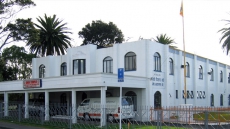Pakistani farmers are up in arms again, this time against increasing duty-free imports of agricultural commodities from India.
Local farmers claim that Indian agricultural subsidy is well over $100 billion, while all farm inputs in Pakistan are taxed heavily, which creates an uneven playing field, Dawn reported Monday.
They said that the Pakistan government allowed 137 items duty free through Wagah border -- the closest possible point to India's agricultural production base and Pakistan's most populated area -- way back in March 2012, which has now become a problem for domestic farmers.
The Pakistani farmers demanded a level playing field in the light of Pakistan informally granting most favoured nation status to India, which implicitly grants India transit trade facility and Pakistani farmers have been vowing to resist.
The government opened the border in particular circumstances to facilitate the import of a few items, which were in short supply in those days and were seeing local prices sky-rocketing.
Since crop harvesting is almost a quarterly phenomenon, sticking to one policy through statutory orders hardly makes sense, the farmers said, adding that their point needed to be heard.
The farmers maintain that India has long been asking for transit trade facility, which Pakistan has been denying. Now Pakistan needs to look into the matter if this Wagah border facility, which was meant to keep prices of perishable items down in Pakistan, is being used to trade beyond the Pakistan market.
It may not be Indian traders but Pakistanis might be acting as the transit facilitator or Afghans might be purchasing from Pakistani market and taking the vegetables home and beyond, the agitating farmers say.
Otherwise, they asked, how could Pakistanis consume Rs.15 billion (around $150 million) worth of tomatoes in a short season or Rs.14 billion worth of beans in the first six months of the current fiscal.
Last year, vegetables and other small items worth Rs.26 billion were imported. This year, the first six months' bill is Rs.16 billion. Pakistani farmers think, with a measure of justification, that Indian farmers are being facilitated at their cost, and have now got together to resist the process.
Last week, almost every notable farmers' group -- Kissan Board Pakistan, Farmers Associates Pakistan, Kissan Ittehad, Awane Zaraat, Sindh Tas Water Council, and Punjab Water Council -- was part of a meeting that was called to discuss the issue. All these independent groups with diverse views came together because the issue on hand concerned all farmers.
In a subsequent press conference, these groups demanded the withdrawal of the statutory notification which allowed duty-free import of 137 items from India through the Wagah border.




